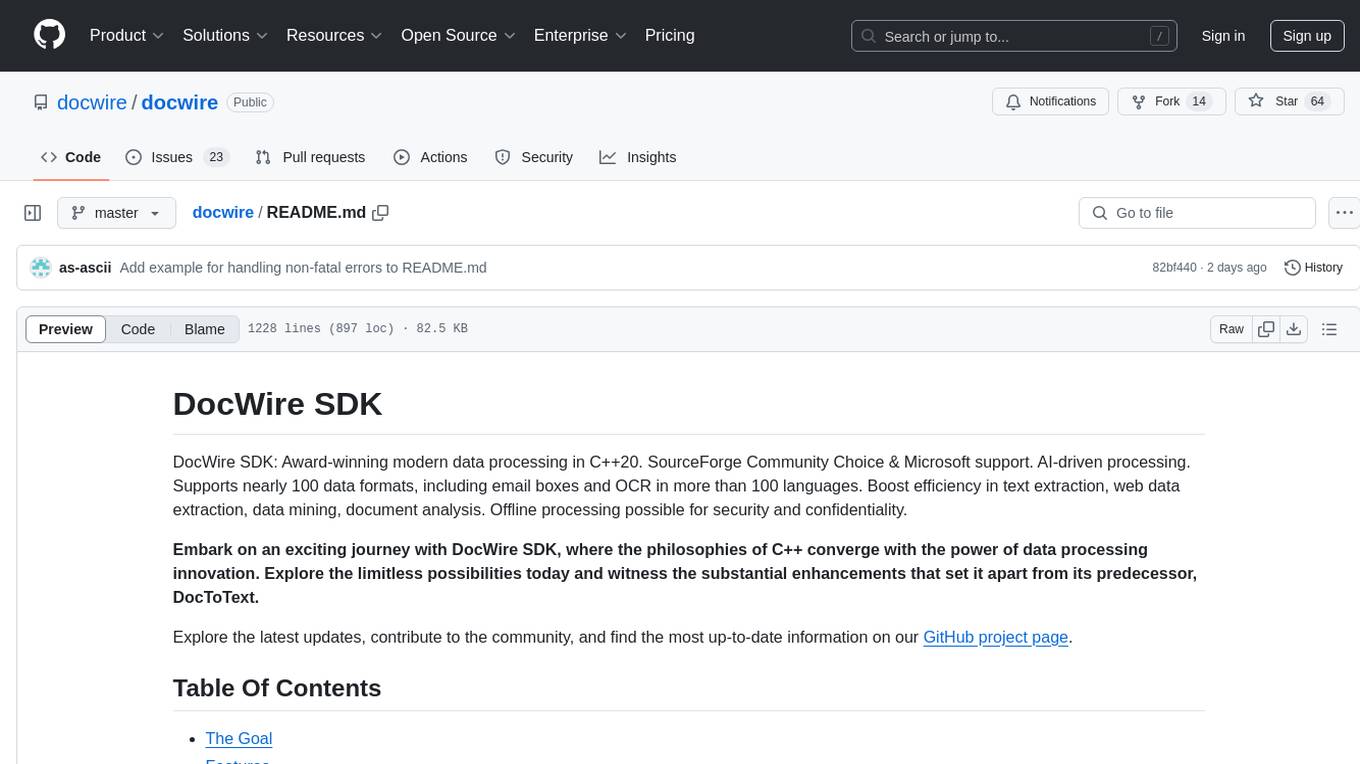
sec-edgar-mcp
A SEC EDGAR MCP (Model Context Protocol) Server
Stars: 120
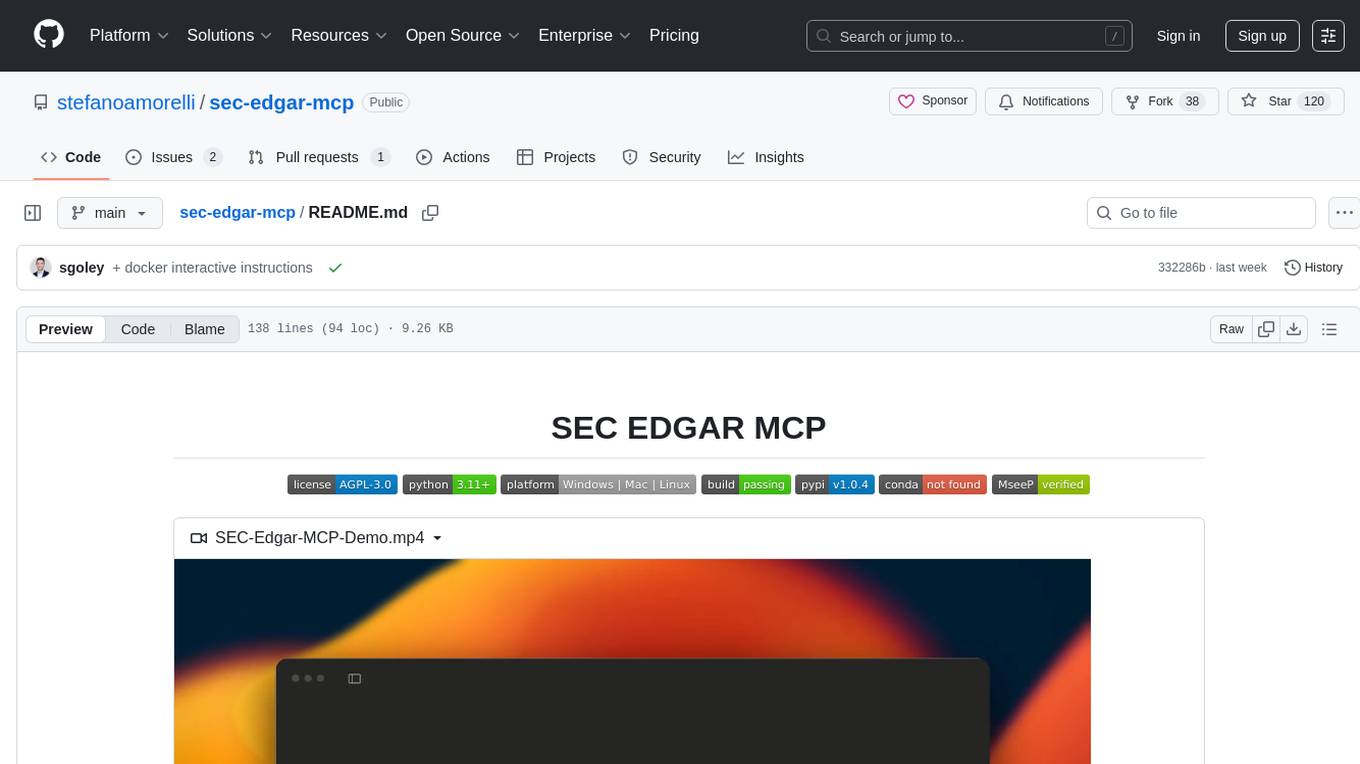
SEC EDGAR MCP is an open-source Model Context Protocol (MCP) server that connects AI models to the rich dataset of SEC EDGAR filings. It provides tools for accessing SEC filing data, leveraging the EdgarTools Python library for fetching data from official SEC sources and performing direct XBRL parsing for financial precision. The server acts as a middleman between an AI client and the SEC's EDGAR backend, offering tools for company lookup, financial statements, insider transactions, and more. Responses are deterministic, maintain exact precision, and include clickable SEC URLs for verification.
README:
https://github.com/user-attachments/assets/d310eb42-b3ca-467d-92f7-7d132e6274fe
[!IMPORTANT] EDGAR® and SEC® are trademarks of the U.S. Securities and Exchange Commission. This open-source project is not affiliated with or approved by the U.S. Securities and Exchange Commission.
SEC EDGAR MCP is an open-source MCP server that connects AI models to the rich dataset of SEC EDGAR filings. EDGAR (Electronic Data Gathering, Analysis, and Retrieval) is the U.S. SEC's primary system for companies to submit official filings. It contains millions of filings and "increases the efficiency, transparency, and fairness of the securities markets" by providing free public access to corporate financial information. This project makes that trove of public company data accessible to AI assistants (LLMs) for financial research, investment insights, and corporate transparency use cases.
Using the Model Context Protocol (MCP) – an open standard that "enables seamless integration between LLM applications and external data sources and tools" – the SEC EDGAR MCP server exposes a comprehensive set of tools for accessing SEC filing data. Under the hood, it leverages the EdgarTools Python library to fetch data from official SEC sources and performs direct XBRL parsing for exact financial precision. This means an AI agent can ask questions like "What's the latest 10-K filing for Apple?" or "Show me Tesla's exact revenue from their latest 10-K" and the MCP server will retrieve the answer directly from EDGAR's official data with complete accuracy and filing references.
[!TIP] If you use this software, please cite it following CITATION.cff, or the following APA entry:
Amorelli, Stefano (2025). SEC EDGAR MCP (Model Context Protocol) Server [Computer software]. GitHub. https://github.com/stefanoamorelli/sec-edgar-mcp
Once the SEC EDGAR MCP server is running, you can connect to it with any MCP-compatible client (such as an AI assistant or the MCP CLI tool). The client will discover the available EDGAR tools and can invoke them to get real-time data from SEC filings. For example, an AI assistant could use this server to fetch a company's recent filings or query specific financial metrics without manual web searching.
For comprehensive guides, examples, and tool documentation, visit the SEC EDGAR MCP Documentation.
To use SEC EDGAR MCP with Docker, add the following configuration to your MCP client:
{
"mcpServers": {
"sec-edgar-mcp": {
"command": "docker",
"args": [
"run",
"-i",
"--rm",
"-e",
"SEC_EDGAR_USER_AGENT=Your Name ([email protected])",
"stefanoamorelli/sec-edgar-mcp:latest"
],
"env": {}
}
}
}Demo: Here's a demonstration of an AI assistant using SEC EDGAR MCP to retrieve Apple's latest filings and financial facts (click to view the video):
In the demo above, the assistant uses SEC EDGAR MCP tools to retrieve Apple's filings and financial data, showcasing how EDGAR information is fetched and presented in real-time with exact precision and filing references. 📊
For installation and setup instructions, visit the SEC EDGAR MCP Quickstart Guide. For complete tool documentation, usage examples, and configuration guides, visit the SEC EDGAR MCP Documentation.
The SEC EDGAR MCP server acts as a middleman between an AI (MCP client) and the SEC's EDGAR backend:
-
🔸 MCP Client: Could be an AI assistant (like Claude or other MCP-compatible tools) or any app that speaks the MCP protocol. The client sends JSON-RPC requests to invoke tools and receives JSON results.
-
🔸 MCP Server (SEC EDGAR MCP): This server defines comprehensive EDGAR tools and handles incoming requests. It features:
- Company Tools: CIK lookup, company information, and company facts
- Filing Tools: Recent filings, filing content, 8-K analysis, and section extraction
- Financial Tools: Financial statements with direct XBRL parsing for exact precision
- Insider Trading Tools: Form 3/4/5 analysis with detailed transaction data
-
🔸 EDGAR Data Sources: The server uses the edgartools Python library to access:
- SEC EDGAR REST API: Official SEC endpoint for company data and filing metadata
- Direct XBRL Parsing: Extracts financial data directly from SEC filings using regex patterns for exact numeric precision
- Filing Content: Downloads and parses complete SEC filing documents (.txt format)
Key Features:
- Deterministic Responses: All tools include strict instructions to prevent AI hallucination and ensure responses are based only on SEC filing data
- Exact Precision: Financial data maintains exact numeric precision (no rounding) as filed with the SEC
- Filing References: Every response includes clickable SEC URLs for independent verification
- Flexible XBRL Extraction: Uses pattern matching to find financial concepts without hardcoded mappings
How it works: The MCP client discovers available tools (company lookup, financial statements, insider transactions, etc.). When invoked, each tool fetches data from SEC sources, applies deterministic processing rules, and returns structured JSON with filing references. This ensures AI responses are accurate, verifiable, and based solely on official SEC data.
In its current form, the MCP server is configured to use the stdio transport. Integrations with platforms such as Dify will require switching to streamable HTTP, or possibly SSE depending on the required backwards compatibility). This can be done by passing a different --transport argument to server.py. However, it may also require editing server.py, because other arguments such as host may need to be passed to the FastMCP constructor.
-
SEC EDGAR – About EDGAR, SEC.gov (2024). EDGAR is the SEC's database for electronic company filings.
-
Model Context Protocol (MCP) – Official documentation and SDKs. ModelContextProtocol.io – An open standard for connecting LLMs to tools.
-
EdgarTools – A modern Python library for accessing SEC EDGAR data with powerful filing analysis capabilities. GitHub repo, Documentation.
A big thank you to all the contributors who have helped make this project better!
This open-source project is licensed under the GNU Affero General Public License v3.0 (AGPL-3.0). This means:
- You can use, modify, and distribute this software
- If you modify and distribute it, you must release your changes under AGPL-3.0
- If you run a modified version on a server, you must provide the source code to users
- See the LICENSE file for full details
For commercial licensing options or other licensing inquiries, please contact [email protected].
© 2025 Stefano Amorelli – Released under the GNU Affero General Public License v3.0. Enjoy! 🎉
For Tasks:
Click tags to check more tools for each tasksFor Jobs:
Alternative AI tools for sec-edgar-mcp
Similar Open Source Tools

sec-edgar-mcp
SEC EDGAR MCP is an open-source Model Context Protocol (MCP) server that connects AI models to the rich dataset of SEC EDGAR filings. It provides tools for accessing SEC filing data, leveraging the EdgarTools Python library for fetching data from official SEC sources and performing direct XBRL parsing for financial precision. The server acts as a middleman between an AI client and the SEC's EDGAR backend, offering tools for company lookup, financial statements, insider transactions, and more. Responses are deterministic, maintain exact precision, and include clickable SEC URLs for verification.
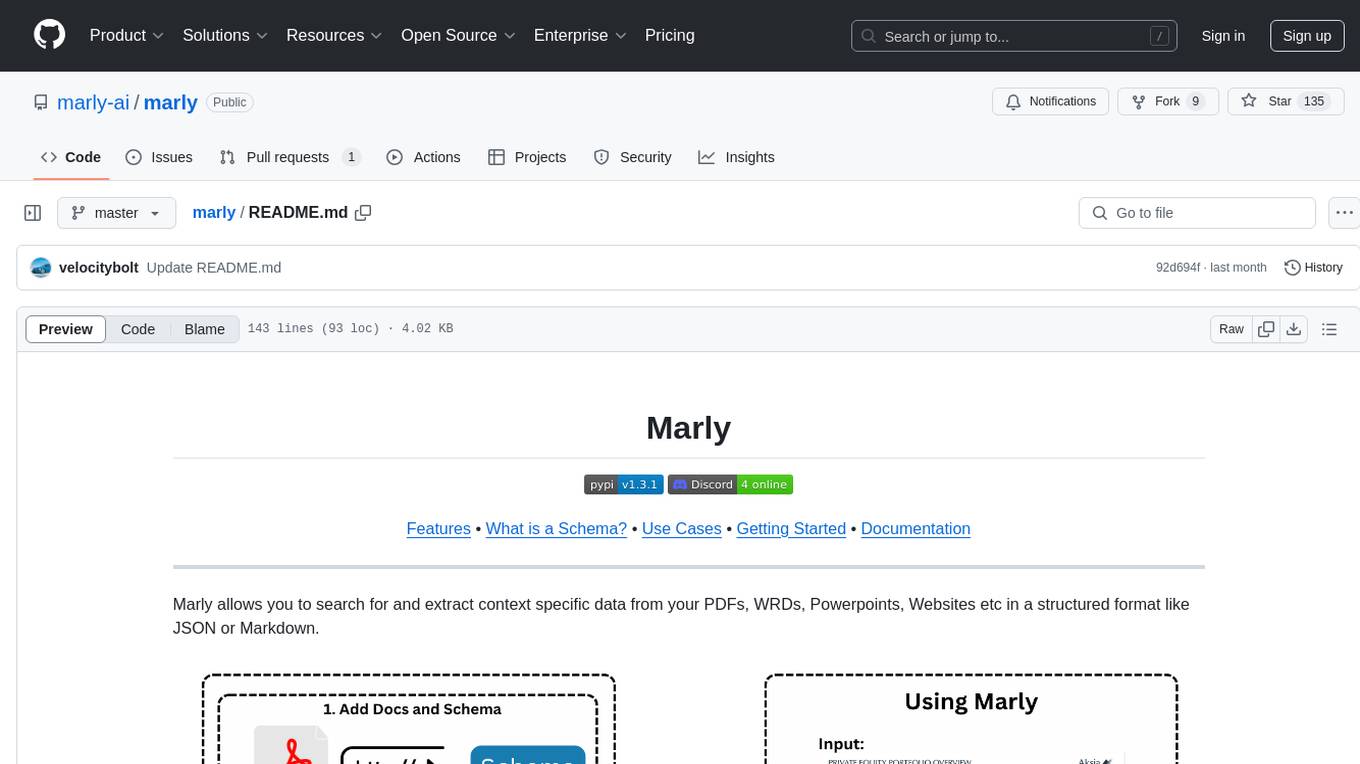
marly
Marly is a tool that allows users to search for and extract context-specific data from various types of documents such as PDFs, Word files, Powerpoints, and websites. It provides the ability to extract data in structured formats like JSON or Markdown, making it easy to integrate into workflows. Marly supports multi-schema and multi-document extraction, offers built-in caching for rapid repeat extractions, and ensures no vendor lock-in by allowing flexibility in choosing model providers.

AIL-framework
AIL framework is a modular framework to analyze potential information leaks from unstructured data sources like pastes from Pastebin or similar services or unstructured data streams. AIL framework is flexible and can be extended to support other functionalities to mine or process sensitive information (e.g. data leak prevention).

ail-framework
AIL framework is a modular framework to analyze potential information leaks from unstructured data sources like pastes from Pastebin or similar services or unstructured data streams. AIL framework is flexible and can be extended to support other functionalities to mine or process sensitive information (e.g. data leak prevention).
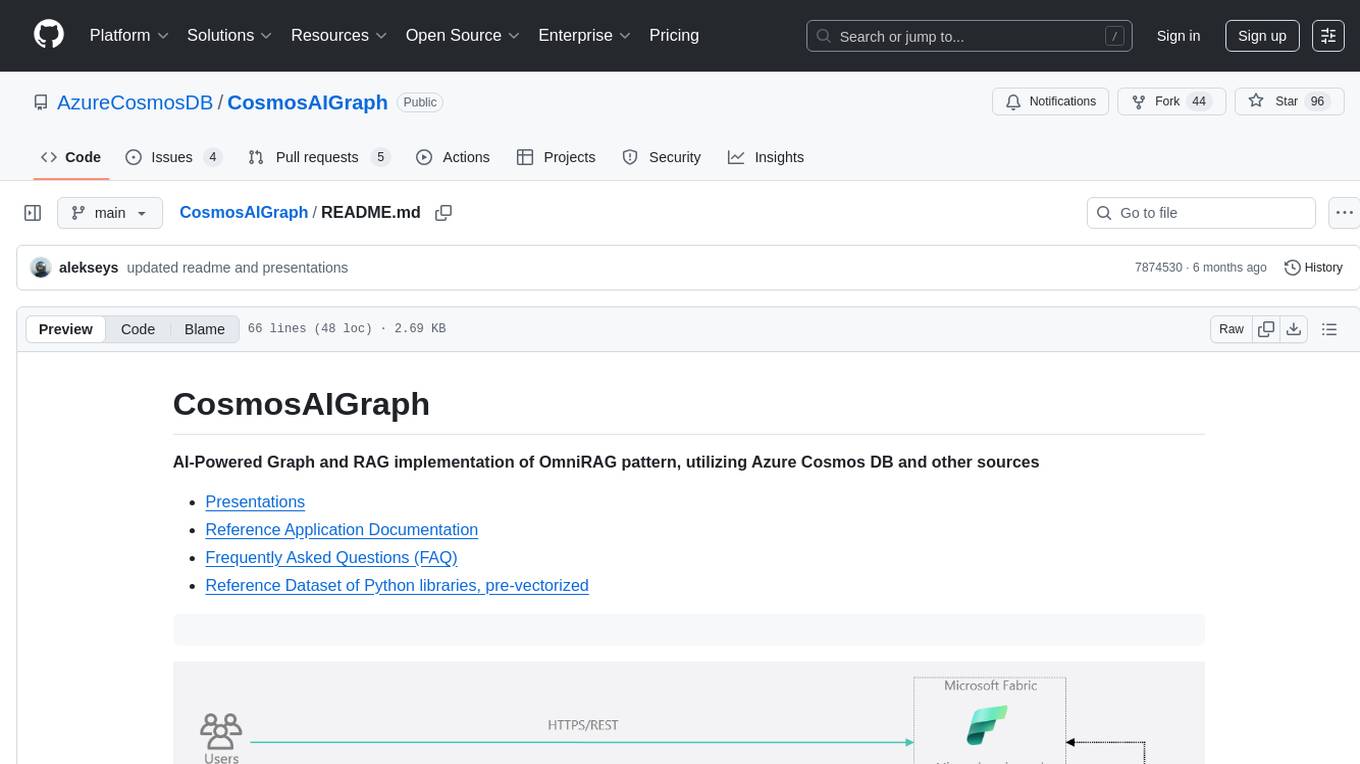
CosmosAIGraph
CosmosAIGraph is an AI-powered graph and RAG implementation of OmniRAG pattern, utilizing Azure Cosmos DB and other sources. It includes presentations, reference application documentation, FAQs, and a reference dataset of Python libraries pre-vectorized. The project focuses on Azure Cosmos DB for NoSQL and Apache Jena implementation for the in-memory RDF graph. It provides DockerHub images, with plans to add RBAC and Microsoft Entra ID/AAD authentication support, update AI model to gpt-4.5, and offer generic graph examples with a graph generation solution.

DevDocs
DevDocs is a platform designed to simplify the process of digesting technical documentation for software engineers and developers. It automates the extraction and conversion of web content into markdown format, making it easier for users to access and understand the information. By crawling through child pages of a given URL, DevDocs provides a streamlined approach to gathering relevant data and integrating it into various tools for software development. The tool aims to save time and effort by eliminating the need for manual research and content extraction, ultimately enhancing productivity and efficiency in the development process.
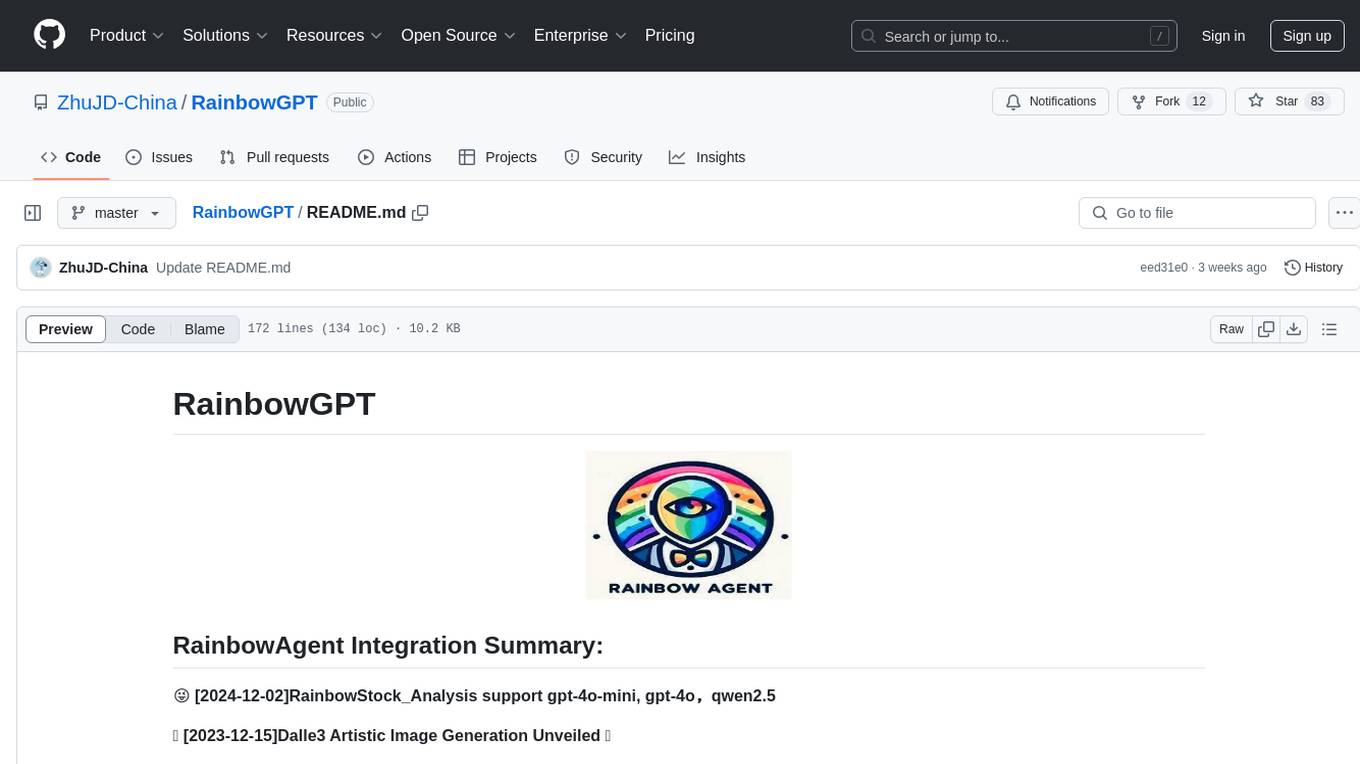
RainbowGPT
RainbowGPT is a versatile tool that offers a range of functionalities, including Stock Analysis for financial decision-making, MySQL Management for database navigation, and integration of AI technologies like GPT-4 and ChatGlm3. It provides a user-friendly interface suitable for all skill levels, ensuring seamless information flow and continuous expansion of emerging technologies. The tool enhances adaptability, creativity, and insight, making it a valuable asset for various projects and tasks.

kollektiv
Kollektiv is a Retrieval-Augmented Generation (RAG) system designed to enable users to chat with their favorite documentation easily. It aims to provide LLMs with access to the most up-to-date knowledge, reducing inaccuracies and improving productivity. The system utilizes intelligent web crawling, advanced document processing, vector search, multi-query expansion, smart re-ranking, AI-powered responses, and dynamic system prompts. The technical stack includes Python/FastAPI for backend, Supabase, ChromaDB, and Redis for storage, OpenAI and Anthropic Claude 3.5 Sonnet for AI/ML, and Chainlit for UI. Kollektiv is licensed under a modified version of the Apache License 2.0, allowing free use for non-commercial purposes.
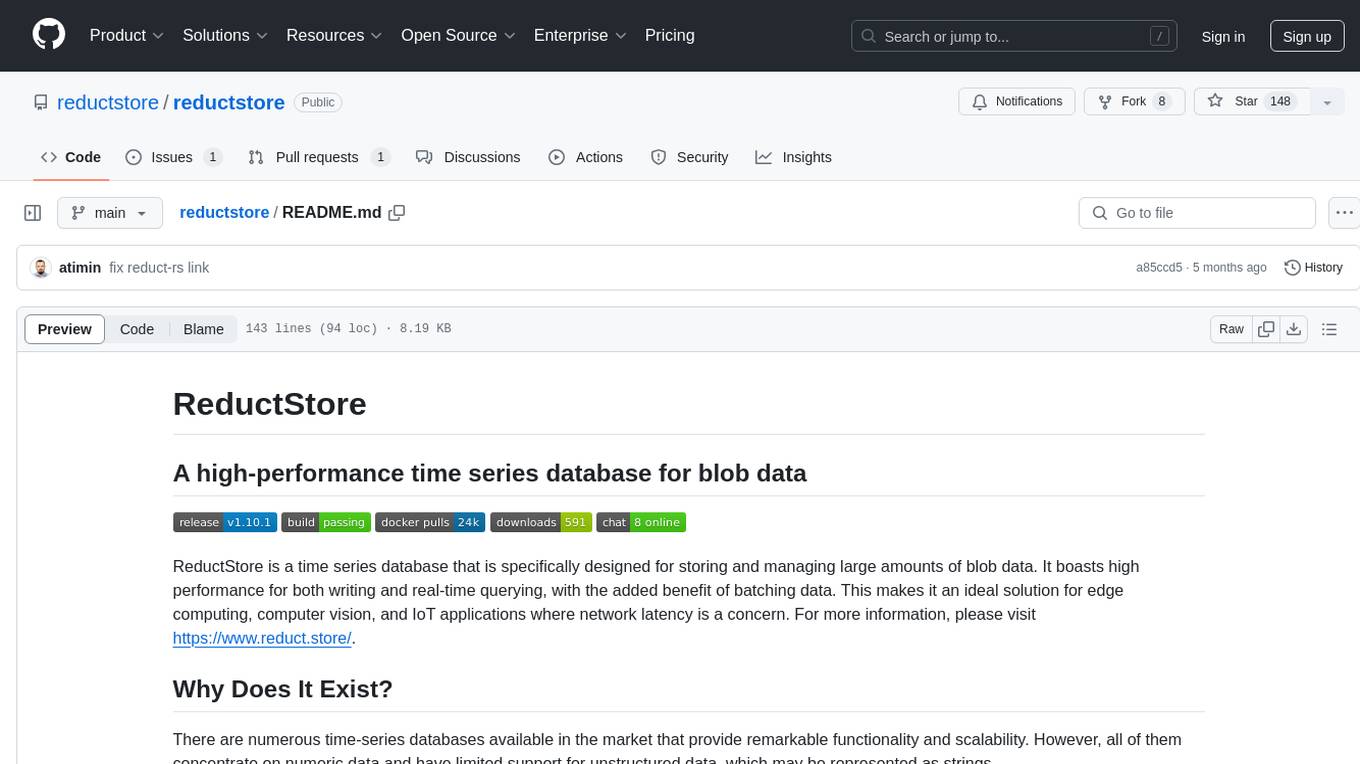
reductstore
ReductStore is a high-performance time series database designed for storing and managing large amounts of unstructured blob data. It offers features such as real-time querying, batching data, and HTTP(S) API for edge computing, computer vision, and IoT applications. The database ensures data integrity, implements retention policies, and provides efficient data access, making it a cost-effective solution for applications requiring unstructured data storage and access at specific time intervals.
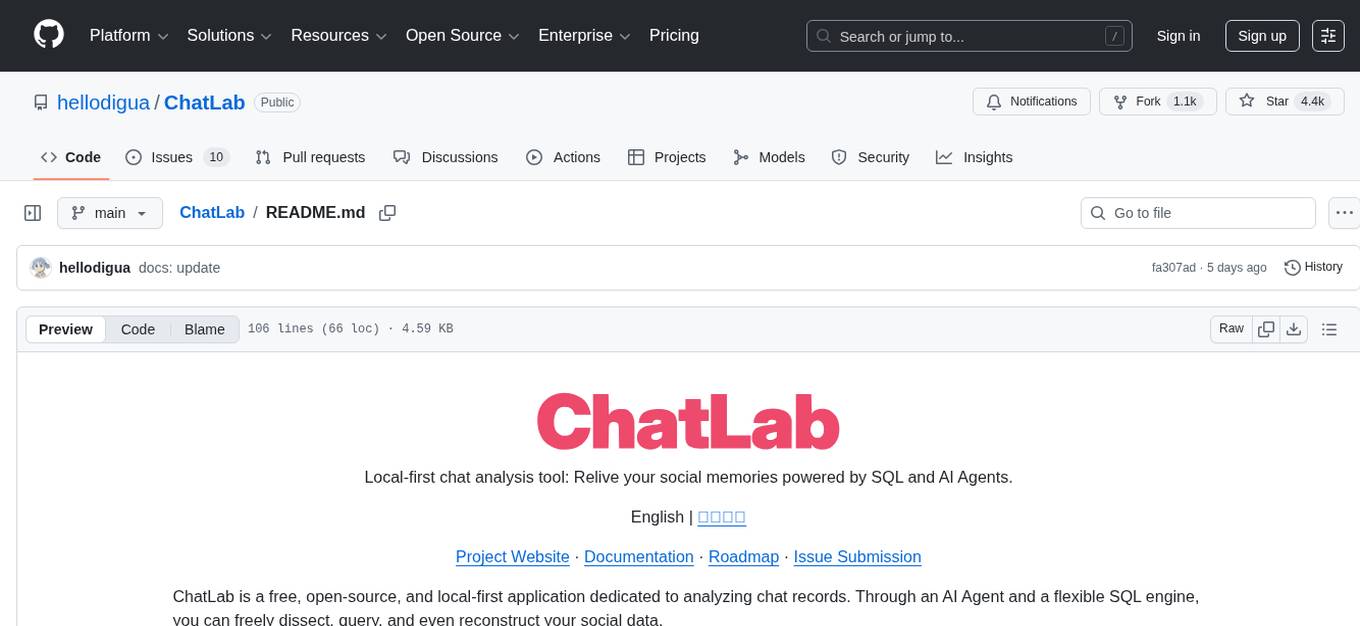
ChatLab
ChatLab is a free, open-source, and local-first application dedicated to analyzing chat records. Through an AI Agent and a flexible SQL engine, you can freely dissect, query, and even reconstruct your social data. It provides ultimate performance, privacy protection, an intelligent AI Agent, multi-dimensional data visualization, and format standardization. The tool supports chat record analysis for various platforms like LINE, WeChat, QQ, WhatsApp, Instagram, and Discord. Users can export chat records, troubleshoot, and access standardized format specifications. The system architecture includes Electron Main Process, Worker and Data Pipeline, and Rendering Process. Local development setup steps are provided for Node.js environment. Contributions are welcome following specific guidelines. Users are advised to read the Privacy Policy & User Agreement before using the software. The tool is licensed under AGPL-3.0 License.
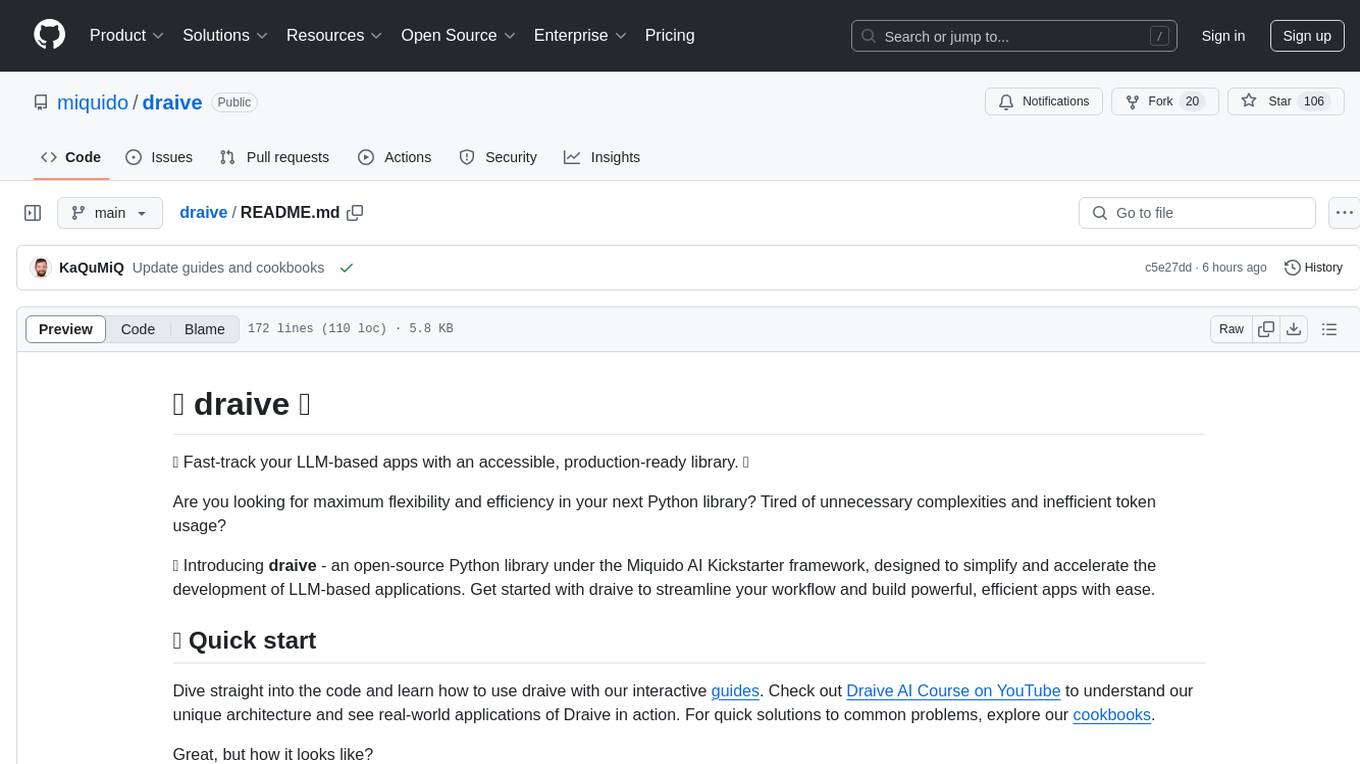
draive
draive is an open-source Python library designed to simplify and accelerate the development of LLM-based applications. It offers abstract building blocks for connecting functionalities with large language models, flexible integration with various AI solutions, and a user-friendly framework for building scalable data processing pipelines. The library follows a function-oriented design, allowing users to represent complex programs as simple functions. It also provides tools for measuring and debugging functionalities, ensuring type safety and efficient asynchronous operations for modern Python apps.
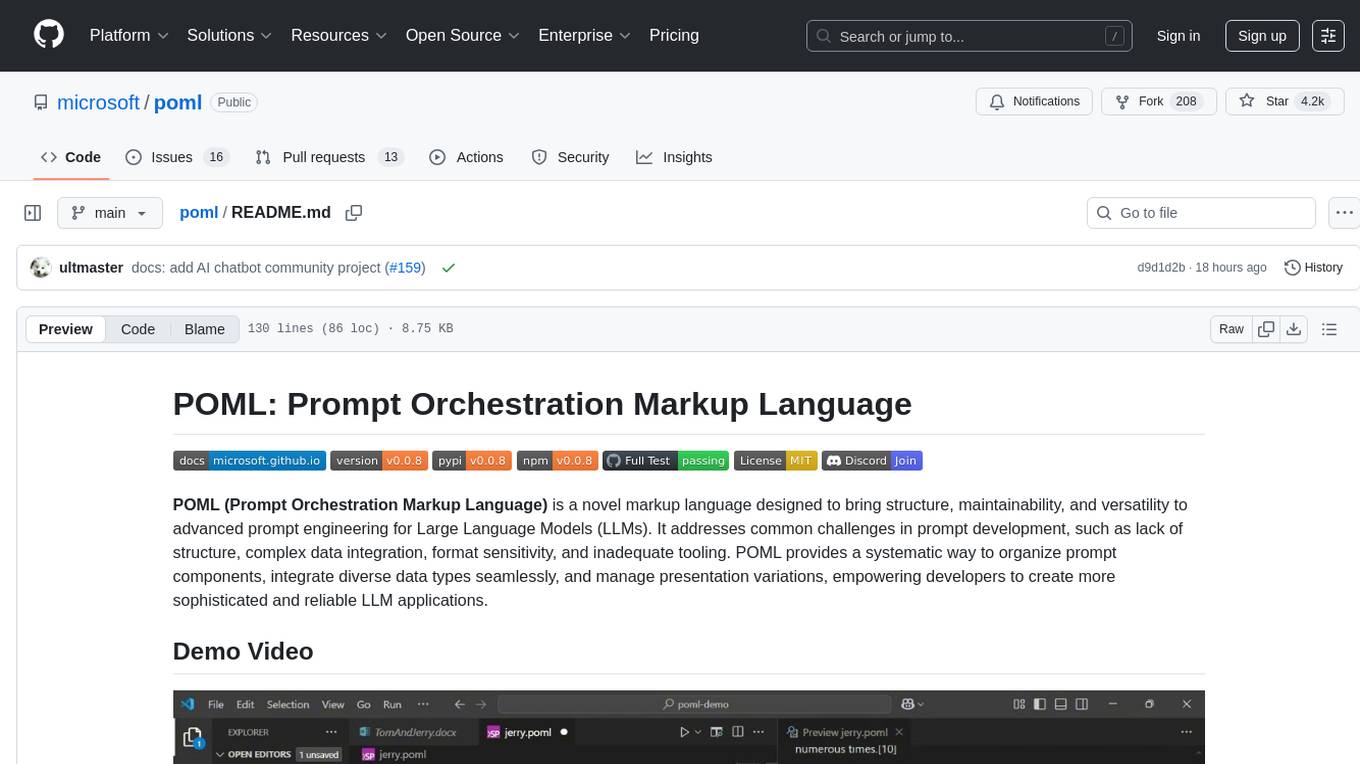
poml
POML (Prompt Orchestration Markup Language) is a novel markup language designed to bring structure, maintainability, and versatility to advanced prompt engineering for Large Language Models (LLMs). It addresses common challenges in prompt development, such as lack of structure, complex data integration, format sensitivity, and inadequate tooling. POML provides a systematic way to organize prompt components, integrate diverse data types seamlessly, and manage presentation variations, empowering developers to create more sophisticated and reliable LLM applications.
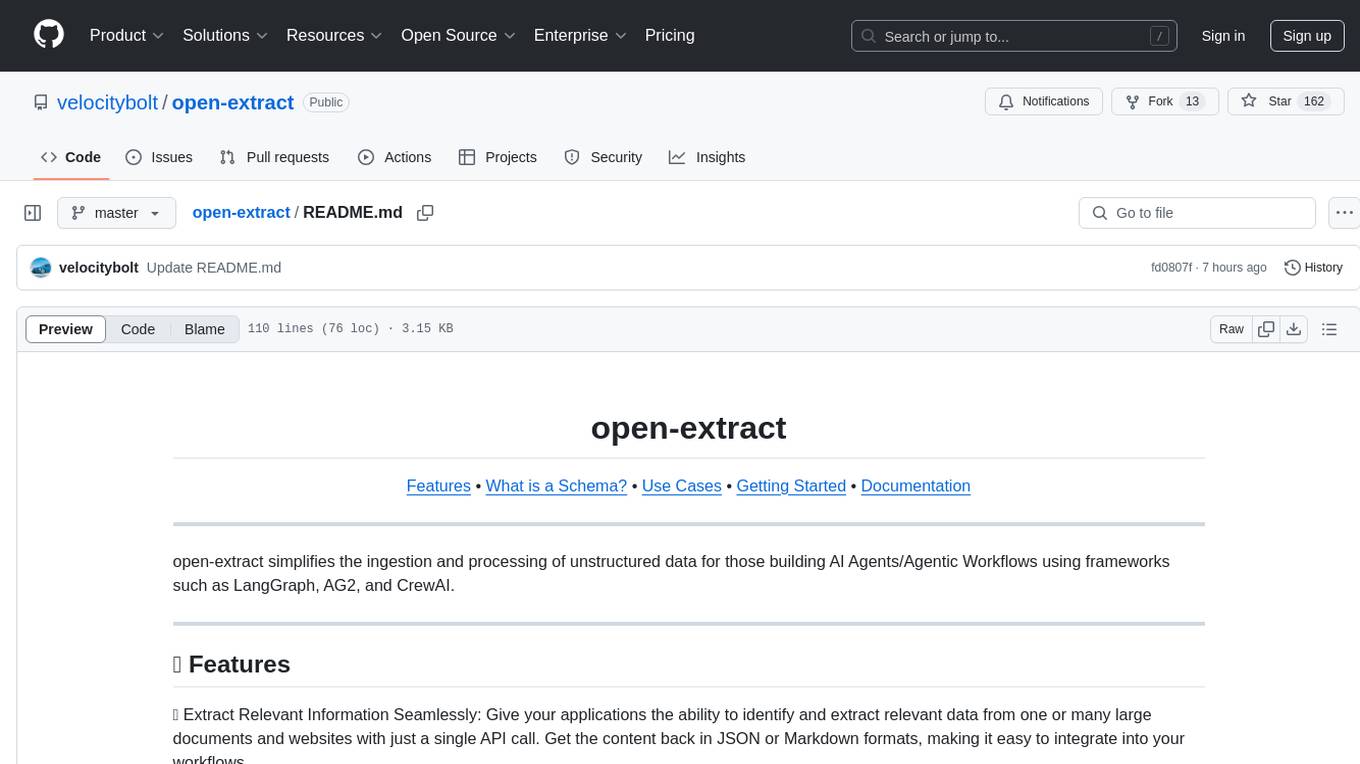
open-extract
open-extract simplifies the ingestion and processing of unstructured data for those building AI Agents/Agentic Workflows using frameworks such as LangGraph, AG2, and CrewAI. It allows applications to identify and extract relevant data from large documents and websites with a single API call, supporting multi-schema/multi-document extraction without vendor lock-in. The tool includes built-in caching for rapid repeat extractions, providing flexibility in model provider choice.
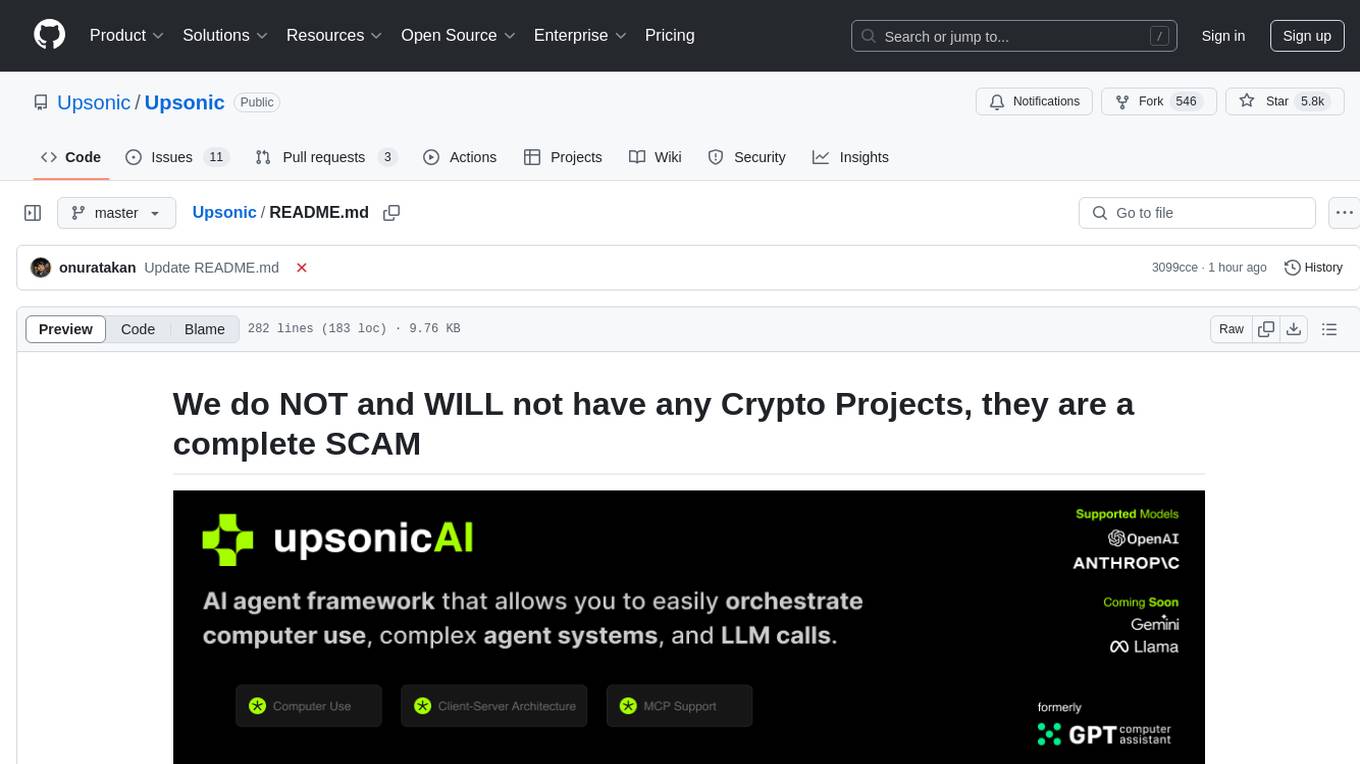
Upsonic
Upsonic offers a cutting-edge enterprise-ready framework for orchestrating LLM calls, agents, and computer use to complete tasks cost-effectively. It provides reliable systems, scalability, and a task-oriented structure for real-world cases. Key features include production-ready scalability, task-centric design, MCP server support, tool-calling server, computer use integration, and easy addition of custom tools. The framework supports client-server architecture and allows seamless deployment on AWS, GCP, or locally using Docker.
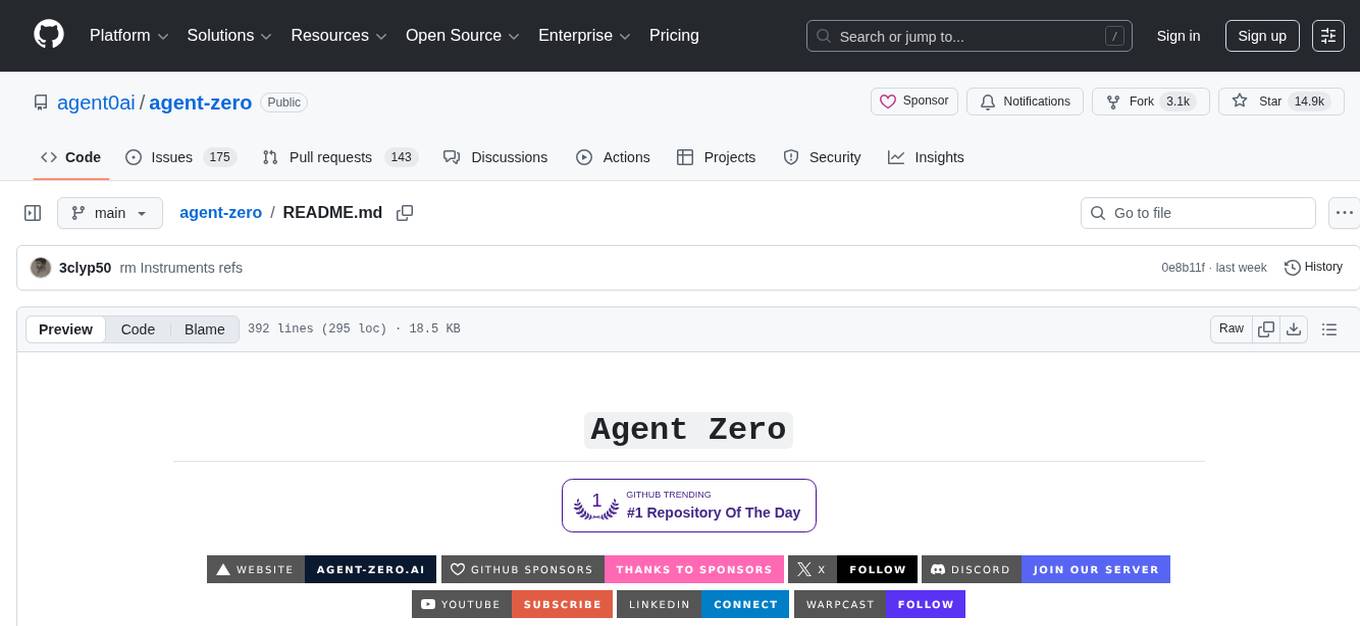
agent-zero
Agent Zero is a personal, organic agentic framework designed to be dynamic, transparent, customizable, and interactive. It uses the computer as a tool to accomplish tasks, with features like general-purpose assistant, computer as a tool, multi-agent cooperation, customizable and extensible framework, and communication skills. The tool is fully Dockerized, with Speech-to-Text and TTS capabilities, and offers real-world use cases like financial analysis, Excel automation, API integration, server monitoring, and project isolation. Agent Zero can be dangerous if not used properly and is prompt-based, guided by the prompts folder. The tool is extensively documented and has a changelog highlighting various updates and improvements.
For similar tasks

sec-edgar-mcp
SEC EDGAR MCP is an open-source Model Context Protocol (MCP) server that connects AI models to the rich dataset of SEC EDGAR filings. It provides tools for accessing SEC filing data, leveraging the EdgarTools Python library for fetching data from official SEC sources and performing direct XBRL parsing for financial precision. The server acts as a middleman between an AI client and the SEC's EDGAR backend, offering tools for company lookup, financial statements, insider transactions, and more. Responses are deterministic, maintain exact precision, and include clickable SEC URLs for verification.
For similar jobs

sweep
Sweep is an AI junior developer that turns bugs and feature requests into code changes. It automatically handles developer experience improvements like adding type hints and improving test coverage.

teams-ai
The Teams AI Library is a software development kit (SDK) that helps developers create bots that can interact with Teams and Microsoft 365 applications. It is built on top of the Bot Framework SDK and simplifies the process of developing bots that interact with Teams' artificial intelligence capabilities. The SDK is available for JavaScript/TypeScript, .NET, and Python.

ai-guide
This guide is dedicated to Large Language Models (LLMs) that you can run on your home computer. It assumes your PC is a lower-end, non-gaming setup.

classifai
Supercharge WordPress Content Workflows and Engagement with Artificial Intelligence. Tap into leading cloud-based services like OpenAI, Microsoft Azure AI, Google Gemini and IBM Watson to augment your WordPress-powered websites. Publish content faster while improving SEO performance and increasing audience engagement. ClassifAI integrates Artificial Intelligence and Machine Learning technologies to lighten your workload and eliminate tedious tasks, giving you more time to create original content that matters.

chatbot-ui
Chatbot UI is an open-source AI chat app that allows users to create and deploy their own AI chatbots. It is easy to use and can be customized to fit any need. Chatbot UI is perfect for businesses, developers, and anyone who wants to create a chatbot.

BricksLLM
BricksLLM is a cloud native AI gateway written in Go. Currently, it provides native support for OpenAI, Anthropic, Azure OpenAI and vLLM. BricksLLM aims to provide enterprise level infrastructure that can power any LLM production use cases. Here are some use cases for BricksLLM: * Set LLM usage limits for users on different pricing tiers * Track LLM usage on a per user and per organization basis * Block or redact requests containing PIIs * Improve LLM reliability with failovers, retries and caching * Distribute API keys with rate limits and cost limits for internal development/production use cases * Distribute API keys with rate limits and cost limits for students

uAgents
uAgents is a Python library developed by Fetch.ai that allows for the creation of autonomous AI agents. These agents can perform various tasks on a schedule or take action on various events. uAgents are easy to create and manage, and they are connected to a fast-growing network of other uAgents. They are also secure, with cryptographically secured messages and wallets.

griptape
Griptape is a modular Python framework for building AI-powered applications that securely connect to your enterprise data and APIs. It offers developers the ability to maintain control and flexibility at every step. Griptape's core components include Structures (Agents, Pipelines, and Workflows), Tasks, Tools, Memory (Conversation Memory, Task Memory, and Meta Memory), Drivers (Prompt and Embedding Drivers, Vector Store Drivers, Image Generation Drivers, Image Query Drivers, SQL Drivers, Web Scraper Drivers, and Conversation Memory Drivers), Engines (Query Engines, Extraction Engines, Summary Engines, Image Generation Engines, and Image Query Engines), and additional components (Rulesets, Loaders, Artifacts, Chunkers, and Tokenizers). Griptape enables developers to create AI-powered applications with ease and efficiency.







